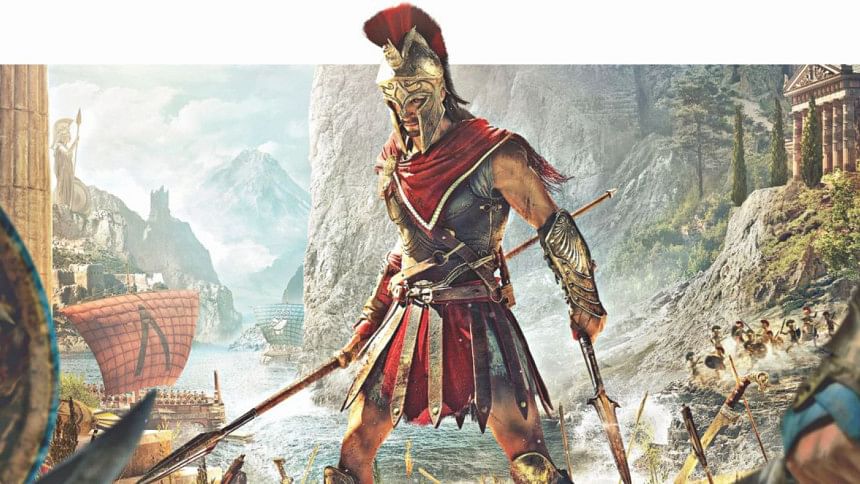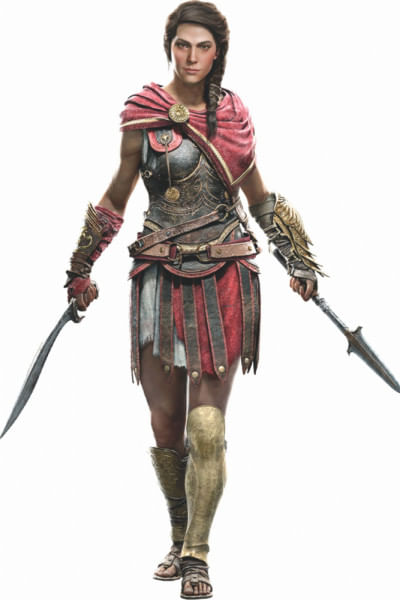Carve Your Odyssey

Set in 431 BCE in Ancient Greece during the Peloponnesian War between Athens and Sparta, Odyssey's island-hopping story sees you playing as the descendant of the legendary Spartan King Leonidas (This is Sparta!). Who you play as in Odyssey marks a first for the Assassin's Creed franchise, as you now have the choice of playing the game exclusively as a male or female character in the shape of siblings Alexios and Kassandra.
Taking place 400 years before Origins introduced the idea of the Assassin Brotherhood and the Templars last year, Odyssey offers a much deeper narrative experience than we've seen from the series so far, with three separate story arcs that will often intersect with each other throughout the game's substantial runtime. Our protagonist (my chosen Alexios) is fuelled by personal motivation. Separated from his family as a child, he's a highly skilled misthios (mercenary for hire) on a quest for answers as he makes his long journey home to Sparta. His search soon uncovers the existence of a mysterious cult. While your path will cross with some of its members during the game's nine long chapters, you'll still have the option to search for the identity of its leader long after Alexios has found the answers he was looking for.
At the heart of Odyssey's excellent story is the new addition of player choice, and for the first time in the series, players can now control how they respond and act in different situations. Through the new conversation system, players can steer the dialogue in cutscenes. These different options can vary hugely from simply digging into the backstory of characters you meet, discovering their intentions, and asking for directions, all the way through to shaping story-defining moments that will lead to one of the game's several different endings and permanently alter the world around you. An example of this comes early in the game when you come across a family who are sick from a plague that has destroyed their village. A group of soldiers are eager to prevent the illness from spreading by killing the family, and so you must decide between their execution or saving them. I chose the second option with little thought at the time and later learned better to my dismay.
Players are now given the choice to play in the exploration or the guided mode. In exploration mode, the locations and objective markers of new quests won't be displayed on the map, instead, you'll have to ask NPCs for last known locations, directions and descriptions to help you find your target. Guided mode, on the other hand, plays like previous games, where you'll be shown where to go on the map before using your eagle Icarus to home in on specific targets.
To help fill the vast world, there's an equally enormous range of missions, side quests and activities to take up your time. The simplest of tasks are a joy to take part in as you meet new colorful characters that are often well written rather than taking part in repetitive work that often plagued earlier entries in the series. Even after hours with the game, I've still got a seemingly endless number of side quests at hand, daily contracts and bounties to pick up from the mercenary boards, and a cult to take down.

This time, there's a whole host of mercenaries who will often be seen making their way around the world. If your notoriety level is too high, a citizen will place a bounty on your head and one of the mercs will be dispatched to take you down, even when you're at sea. You can resolve these bounties in a number of ways, such as choosing to hunt down the citizen that is paying the bounty, paying off the bounty yourself, running as fast as you can, or facing up to the challenge. Facing the challenge is often the most rewarding as you'll gain some additional loot if you win, but there's also the issue that you may well end up increasing your notoriety and having to deal with more mercs that are sent your way.
The mercenaries clearly draw heavily from Middle-earth's Nemesis system, where new mercs will take the place of those you've dealt with. Being a mercenary yourself, you'll also gradually climb the leaderboard as you attempt to become top dog.
There are also mass battles to take part in to dictate which of the warring factions in the Peloponnesian War will sit as the rulers of each island. These take place in spectacular large battles with around 100 different characters fighting at once. Being a mercenary who holds little love for Sparta from his childhood, Alexios is free to choose which side he wants to lend his sword to. Although it's a good idea, the result of who wins and losses offers nothing to the game outside of some new loot, lots of XP and money if you manage to come out on top.
The combat in Odyssey is built upon the foundations laid with Origins. Odyssey removes the ability to block enemy strikes with the comfort of a shield. Instead, you'll need to use a little more finesse as you attempt to parry and dodge enemy strikes. New special abilities are unlocked with experience points as you level up throughout the game. Many of the abilities need to be assigned to the face buttons and require adrenaline earned through landing your own attacks to use them. Each special ability feels worthy, making it hard to choose which of them to use as you can only have four melee and four hunter (bow and arrow) skills assigned at once.
The loot system has also been built upon further with new engravings available to add buffs and abilities to each of the weapons and armor pieces that you carry. New engravings unlock as you progress through the game, but they don't come cheap, so there's a conflict of adding an expensive engraving for an instant boost now but with the certainty that you will have access to higher DPS weapons as you level up.
There's also the return of naval combat, which largely operates the same way it did in previous games with an expanse of water readily at hand. It's the same basic combination of firing arrows, throwing javelins and ramming enemy ships, although this time around there are a lot more options for upgrading your ship, the Adrestia, to buff damage and strength, as well as assigning NPCs you meet in the game to become lieutenants, each offering their own unique buffs. Whilst the combat feels good, there is always the option to ignore it completely by sailing away, and without the forts from Black Flag that need to be attacked from the sea, it doesn't feel as essential outside of travel.
Assassin's Creed Odyssey is an ambitious game that takes a huge leap in the right direction. The world is stunning. The combat feels more nuanced and better than it has in any other game in the series, and the inclusion of choices both big and small impacts the world and creates a much deeper narrative experience. There are still some rough spots then need addressing in future titles, and some of the new additions don't work as well as they should, but Odyssey sets a new bar for what an Assassin's Creed game can be.
Tamim Bin Zakir aka Shwag_Lord(PSN ID) is an enraged individual who seldom thinks of being generous to others. Feel free to devour his tranquility at [email protected]

 For all latest news, follow The Daily Star's Google News channel.
For all latest news, follow The Daily Star's Google News channel. 



Comments